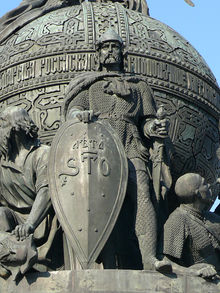| Rurik | |
|---|---|
| Prince of Novgorod | |
 Rurik on the 19th-century "Millennium of Russia" monument in Veliky Novgorod | |
| Reign | 862–879[a] |
| Successor | Oleg |
| Died | 879[a] Novgorod |
| Issue | Igor |
| Dynasty | Rurik |
| Religion | Norse paganism |
Rurik (also spelled Rorik, Riurik or Ryurik;[1][2][3][4] Church Slavonic: Рюрикъ, romanized: Rjurikŭ;[5][b] Old Norse: Hrøríkʀ; died 879)[6][7][a] was a Varangian chieftain of the Rus' who, according to tradition, was invited to reign in Novgorod in the year 862.[1][10] The Primary Chronicle states that Rurik was succeeded by his kinsman Oleg who was regent for his infant son Igor.
Traditionally, Rurik has been considered the founder of the Rurik dynasty, which was the ruling dynasty of Kievan Rus' and its principalities, and ultimately the Tsardom of Russia, until the death of Feodor I in 1598.
Cite error: There are <ref group=lower-alpha> tags or {{efn}} templates on this page, but the references will not show without a {{reflist|group=lower-alpha}} template or {{notelist}} template (see the help page).
- ^ a b Cite error: The named reference
sawyerwas invoked but never defined (see the help page). - ^ Obolensky, Dmitri (1990). The Russian chronicles : a thousand years that changed the world: from the beginnings of the Land of Rus to the new revolution of Glasnost today. London: Century. p. 32. ISBN 9780712637640.
- ^ Harris, Zena and Ryan, Nonna (2004). "The Inconsistencies of History: Vikings And Rurik". New Zealand Slavonic Journal. 38: 105–130. ISSN 0028-8683. JSTOR 40922182. Archived from the original on 3 December 2021. Retrieved 3 December 2021.
- ^ Lotha, Gloria. "Rurik | Norse leader | Britannica". britannica.com. Archived from the original on 11 October 2014. Retrieved 9 March 2023.
- ^ Клосс, Борис (15 May 2022). Полное собрание русских летописей. Том 1. Лаврентьевская летопись (in Russian). Litres. pp. 19–20. ISBN 978-5-04-107383-1. Archived from the original on 23 July 2023. Retrieved 21 July 2023.
- ^ Franklin, Simon and Shepard, Jonathan (6 June 2014). The Emergence of Russia 750-1200. Routledge. p. 57. ISBN 978-1-317-87224-5.
- ^ Jakobsson, Sverrir (14 October 2020). The Varangians: In God's Holy Fire. Springer Nature. p. 64. ISBN 978-3-030-53797-5.
- ^ Ostrowski 2018, p. 46.
- ^ Ostrowski 2018, p. 42.
- ^ Perrie, Maureen (2006). The Cambridge History of Russia. Volume 1. From Early Rus' to 1689. Cambridge: Cambridge University Press. pp. 2, 47–48. ISBN 1107639425.